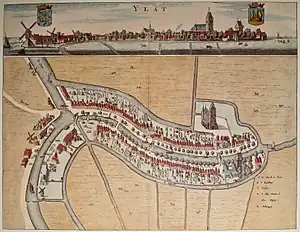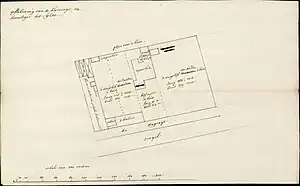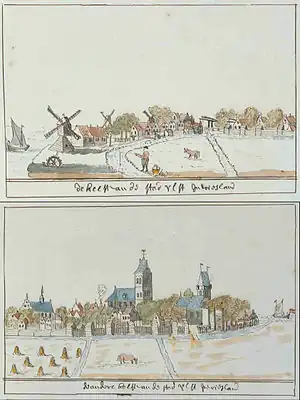


53°00′22″N 5°37′34″E / 53.00599492466169°N 5.626003305773826°E
The Ylostins (or Ilostins) was a Frisian castle or a so-called stins in the city of IJlst, Friesland, Netherlands
History
It is not clear whether the city of IJlst gave its name to the Ylostins, or whether it was the other way around. The Harinxma thoe IJlst[1] family founded the Ylostins in the Middle Ages, probably around 1400.[2] After the family, the castle was also called Harinxmastins.[3] The Ylostins was on the south side of the city. Together with the church on the north side, it formed a defensible complex.[4] The owner of the Ylostins was also the “eeheer or olderman” of IJlst.[5] After the last Harinxma's passed away, the Ylostins came into the hands of local noble families such as Galama and Vegelin van Claerbergen, through inheritance and purchase and sale.
The Ylostins was a so-called tower house (Dutch: torenstins) like the still existing Skierstins. It consisted of a detached residential tower with bartizans at the top, with an U-shaped residential building next to it. The tower was additionally crowned with a hipped roof with decorative weather vanes.[6] Small arched windows were installed in the walls.[7] There also seem to have been painted windows, probably by the couple Tiete and Bernardina van Galama.[8] If this is correct, then these windows may have been made by Julius van Galama, who married in IJlst in 1670.[9] In terms of shape, the stins had great similarities with the Gruytermastins in Sneek.[10]
Around 1710 the Ylostins still existed, but it was in a poor state of repair. After much deliberation, the owner, squire Hessel Vegelin van Claerbergen from Joure, decided to demolish the large tower in March 1711. The seven-metre-long beams were sold to farmers in the area.[11] The state archives in Leeuwarden (Tresoar) still keep some documents relating to this,[12][13] including a map of the Ylostins and its immediate surroundings.[14] The map shows the tower, the big house and other structures, surrounded by tall elm trees.[15] The last remains of the Ylostins were demolished in 1778.[16]
In the 1960s there were excavations (led by Herre Halbertsma) at the place where the Ylostins were suspected. However, the demolition was thorough and nothing has been found of the foundations. They found only soft ground with no debris.[17]
The residential center for the elderly in IJlst is named after the castle: 'Nij Ylostins'.
References
- ↑ "Genealogie van het adellijk geslacht van Harinxma (thoe Ijlst)". www.simonwierstra.nl. Retrieved 11 March 2023.
- ↑ "IJlst; Ilostins". October 2009. Retrieved 28 February 2023.
- ↑ Buwalda, André. "Harinxma stins te IJlst (of: Ylostins)". www.andrebuwalda.nl. Retrieved 28 February 2023.
- ↑ Ronald Elward en Peter Karstkarel (1990). Stinsen en States Adellijk wonen in Friesland. Drachten Leeuwarden: Friese Pers Boekerij bv. p. 160. ISBN 978-9033002342.
- ↑ "IJlst; Ilostins". October 2009. Retrieved 28 February 2023.
- ↑ Buwalda, André. "Harinxma stins te IJlst (of: Ylostins)". www.andrebuwalda.nl. Retrieved 28 February 2023.
- ↑ "Ilostins te IJlst". www.stinseninfriesland.nl. Retrieved 11 March 2023.
- ↑ "Tiete van Galama". Retrieved 28 February 2023.
- ↑ "Tiete van Galama". Retrieved 28 February 2023.
- ↑ "IJlst; Ilostins". October 2009. Retrieved 28 February 2023.
- ↑ Herre Halbertsma (4 July 1968). "Oudheidkundig onderzoek: graven in IJlster bodem levert gemeente 5 graven op: geen resten van Sint-Mauritiuskerk en stins". Sneeker Nieuwsblad.
- ↑ "4698 Stukken betreffende de verwerving door Hessel Vegilin van Claerbergen van de Ilostins te IJlst met huizen, landerijen c.a. aldaar, waarbij hij een boerderij te Engelum afstaat aan Valerius van Glinstra". www.archieven.nl. Retrieved 11 March 2023.
- ↑ "4781 Stukken betreffende het beheer door Hessel Vegilin van Claerbergen van de Ilostins te IJlst met huizen en landerijen aldaar; met twee kaarten". www.archieven.nl. Retrieved 11 March 2023.
- ↑ "Situatiekaartje van de Ilostins en omgeving te IJlst, aangekocht door Hessel Vegiln van Claerbergen. N.B. Met opgave van enkele oppervlaktematen". www.tresoar.nl. Retrieved 11 March 2023.
- ↑ Herre Halbertsma (4 July 1968). "Oudheidkundig onderzoek: graven in IJlster bodem levert gemeente 5 graven op: geen resten van Sint-Mauritiuskerk en stins". Sneeker Nieuwsblad.
- ↑ Ronald Elward en Peter Karstkarel (1990). Stinsen en States Adellijk wonen in Friesland. Drachten Leeuwarden: Friese Pers Boekerij bv. p. 160. ISBN 2-87193-212-3.
- ↑ Herre Halbertsma (4 July 1968). "Oudheidkundig onderzoek: graven in IJlster bodem levert gemeente 5 graven op: geen resten van Sint-Mauritiuskerk en stins". Sneeker Nieuwsblad.
Literature
- Mr. S.J. Fockema Andreae en Dr. G. Bakker (1968). IJlst 1268 - 1968 (Sudwesthoeke-Rige Nr. 5). Bolsward/ Leeuwarden: A.J. Osinga NV/ Fryske Akademy. p. 72.
- Ronald Elward en Peter Karstkarel (1990). Stinsen en States Adellijk wonen in Friesland. Drachten Leeuwarden: Friese Pers Boekerij bv. p. 176. ISBN 978-9033002342.
- Herre Halbertsma (4 July 1968). "Oudheidkundig onderzoek: graven in IJlster bodem levert gemeente 5 graven op: geen resten van Sint-Mauritiuskerk en stins". Sneeker Nieuwsblad.
External links
"Ilostins te IJlst". Stinsen in Friesland. Retrieved 28 February 2023.